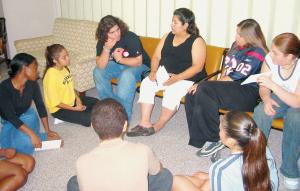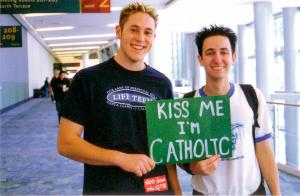Issue Date: August 29, 2003
By ARTHUR JONES Up close and enjoyable: Catholic youth gathered en masse for Mass. It’s an annual rite of Catholic teen passage in California -- the spring gathering of thousands of happy, noisy, multiethnic Catholic teens at the annual Los Angeles archdiocesan Religious Education Congress Youth Day. They sport school or parish T-shirts, sing out at liturgies, ask questions at workshops, laugh at jokes, and give off the aura that all is right with their world. For many it is. But it is not an untroubled world. Today’s teens know their peers’ struggles with broken marriages, broken homes and broken promises, issues of the meaning of family life and normal teenage confusion over social mores and the lure of an empty consumerism. Any angst seems offset by their energy, enthusiasm and a fledgling spirituality searching for deeper roots. To explore the topic of young Catholics a little further, NCR attended Anaheim Youth Day workshops in February, sent out a half-dozen books for mini-reviews (see Web site at NCRonline.org) and by e-mail sampled the views of youth ministers, directors of religious education and pastors dedicated to helping and educating young Catholics in the faith. Among the signs of hope are a boom in parish youth ministry and a determination in the Catholic church’s focus on its young people at the parish level. “Youth ministry is a growth industry,” explained Robert McCarty, executive director of the [National Federation for Catholic Youth Ministry], “and the interest in youth ministry as a vocation is phenomenal. It used to be the college students I heard from,” said McCarty, “but in the last two years, and for the first time, I’ve started to get e-mails from high school young people who want to be full time youth ministers. They’re asking: Where should I go to school? What should I study?” Young Catholics are not “a problem to be solved,” said McCarty. They are young adults confronted by many of the issues that confront older generations, even if their response is slightly different. For example, he said, young people have not necessarily responded to the clerical sexual abuse scandal with the same sense of horror over institutional and clerical betrayal as their parents. McCarty, a speaker at the Anaheim gathering, told NCR in an interview, “I think Catholic youth expect less. They don’t expect perfection the way perhaps their parents, or many of us, did. The young people are not as surprised when the church’s humanness or woundedness comes through.” Unlike young Catholics of the 1970s, a generation angry at institutions, McCarty said, “this generation is more apathetic toward institutions.” How they see the church also reflects how they view education or government, he said. Common issues Claudia Vázquez Puebla is youth director and Fr. Michael Hermes is pastor at St. Joseph-St. Benedict Church in Kansas City, Kan. Their work is primarily with an urban, Hispanic, immigrant population. The common issues in the youths’ lives, they report, are stress in the family (economic, material and parent/child tensions), inculturation (the pressure of life in two cultures) and spiritual hunger. Today’s youth want to know more about their faith and want a strong relationship with God and with the church community, the two agreed. In a world experiencing terrorism and war, Vázquez Puebla and Hermes agree, young people are stressed by the violence in the world and in their communities, but they maintain goals, especially acquiring an education. At the Church of the Nativity in Leawood, Kan., the upper-middle-class parish where Debbie Nearmeyer is coordinator of youth ministry, the “daily stressors for teens I work with revolve around the typical middle-class views of success: grades and school work, sports and extracurricular activities, and having the ‘right’ friends.” “The students are less concerned about developing deep relationships with their peers than with creating a successful lifestyle,” said Nearmeyer. “The goal is to be a successful student academically and to have your college resumé full of service activities in school and the community.” Fr. Mark Goldasich, pastor of Sacred Heart Parish in Tonganoxie, in rural Kansas, sees a situation in which, “especially after 9/11, kids are living an ‘eat, drink and be merry’ existence. The world is uncertain and scary, so grab what you can now. The uncertainty extends to families. There are so many ‘combinations’ now I’m not sure the kids really feel they belong anywhere. “For some kids,” he said, “their parents are lukewarm at best about their own faith, so the kids react either by being nominal Catholics themselves or by becoming ‘super Catholics,’ very tied into a more conservative, ‘certain’ church with definite rules. “Their mobility is also a factor,” said the pastor. “They don’t feel parish roots as I did, growing up in the same parish until I went away to college.” Finally, said Goldasich, “there’s a rampant materialism, which can lead to two responses: wastefulness on the one hand (a throwaway culture) and emptiness on the other. They have just about everything, but still are unsettled and searching for more. They’ve forgotten how to be ‘kids.’ They’re too busy with activities; have a tough time being still.”
Jaclyn Laffleur is director of religious education at St. Matthew Parish in Topeka, Kan. She sees today’s young people having to struggle simultaneously with relationships and their own identity. “They worry about family issues and relationships as they struggle with fitting in at the same time as trying to discover who they are and what they stand for. Is it OK to be different from the norm? Will their friends still like them for who they are, or do they need to project a certain image to be accepted? “They are learning to be independent,” she said, “but realize they still need their parents involved in their life. Many of the youth I know have worries about college, careers, what they will do with their life and what God wants them to do with their life. [These issues] are constantly bombarding them and they don’t have all the answers -- and I’m not sure they realize they don’t have all the answers.” Fr. William Franken, pastor at St. John the Evangelist Parish in Hydes, Md., listed the concerns of the young people he sees, “in order of priority: sexuality, dating, sex; will there be a future for them; fear of nuclear holocaust, terrorism; divorce and family relationships; changing models of family life. They’re coping with self-esteem issues,” he said, “and identity in a culture where the stage of childhood diminishes. They grow up too fast.” Service to others Franken said teens have a desire to be of service to others. “They possess an attitude of caring even though they are often perceived as selfish, a sense of spirituality and belief in God even though they may not attend church on a regular basis,” he said. “And they want to experience a community where they belong and feel accepted.” “They are very passionate,” Laffleur of Topeka said, “that is another strength. They know what they believe in and are not afraid to stand up for it.” Goldasich, the Tonganoxie pastor, spoke of the teens’ “incredible energy and enthusiasm. They’re not as color-conscious as I was growing up and seem comfortable for the most part with different races and cultures.” And while they are computer and technology savvy, he said, they’re perhaps not as able as an earlier generation “to judge what on the Web is reliable information and what is trash.” “They do have a tremendous fascination with John Paul II and tend to quote the pope’s pronouncements and follow them.” Sounding a familiar note, the priest added, “They seem to be much more resilient and streetwise because it seems they grow up sooner.” Vázquez Puebla of Kansas City added that the teens’ strengths “are in their expression of ideas. Our youth are creative and have a lot to say about the way things are and how they can be. They volunteer to help the community. They’re very good at supporting one another -- they provide the first line of support for their peers.” Connecting youth to parish As seen by Hermes and Vázquez Puebla, the youth connect in three ways:
Hermes and Vásquez Puebla wrote in response to an NCR question that their message to their young people is “that God gives us what we need to get through life and to accomplish his will for us. That is why he sent us Jesus Christ and gives us the Holy Spirit, and why we have the sacraments, and the scriptures and each other.”
Goldasich said, “I think that Catholicism can be a great anchor for these kids. … There is a great deal of relevance in our faith for tackling the real problems of the world, a great deal of idealism that can dovetail with the idealism of youth. The parish can be a stable ‘family’ that many of these kids may not experience in their homes.” Laffleur said the youth minister connects by helping young people “realize it is all from God, the good, the bad, and the ugly. When they can recognize that their strength is from God, it boosts that confidence and gives them more reason to put their trust in him. “But they also need to recognize,” she said, “that their worries and fears are no reason to doubt God or be angry with Him. He can make good come from even the seemingly hopeless situations.” Nearmeyer sees young people drawing their strength from their faith. “They want a faith of their own not their parents’ faith. Our young people are filling our pews. Not for the typical reasons of the past (‘my parents made me or I feel guilty if I don’t go’) but ‘I want to understand what this church stuff is all about,’ or ‘I really draw strength and comfort from the Mass.’” They are not coming passively and taking it at the word of the adults. These young people want facts, the meat of our faith.” She continued, “They don’t want to talk about how it makes them feel -- they want apologetics, facts and reasons. I don’t want to make it sound as if they have no room for mystery because that is not the case. They want to know and understand the Catholic faith so they know they are standing on firm ground and can defend the faith to their community as well as to themselves. “They are also drawing strength from their families,” Nearmeyer said. “We have seen in our community teens bringing their families back to church. Parents will follow their children if they believe their children are being cared for. In parishes where ministry to teens is happening, families are getting more involved.” No hand-me-down answers In their closing commentaries, these parish leaders provide insights into the demands on the church to explain itself and defend itself before an energetic body of Catholics who want to believe but have to be convinced. Those interviewed by NCR reveal a youth not satisfied with a catechesis based on hand-me-down answers. Young people are prepared to both accept and defend their faith -- provided that in reply to their many questions they are given answers that make sense in the light of their experience and their faith. Franken said he fits catechesis into “a holistic approach. ... It includes informing them of the church’s position on their issues. Catechesis needs to respond to their needs, and not to what adults think they [the youth] need to know. Experiential catechesis creates opportunities for them to live their faith and make a connection between hearing God’s word and responding to it.” “Teens crave catechesis,” said Laffleur in Topeka. “We focus so much on prayer, liturgy, praise and such, and they love that, but they want to know more. They have a desire to dig deeper, they have questions upon questions, and they are searching for answers, for reasons, for something they can grab hold of. “They aren’t happy just going to church. They want to experience the church so they can be the church.” In Kansas City, Kan., Vasquez Puebla and Hermes are convinced that catechesis needs to be grounded in real life situations. “We don’t try to paint a pretty picture that life is always perfect, because we know from our own experiences that it is not. But somehow we find, that even in the difficulties and even in the mess, God is present and working through it all,” they responded in a joint message. “Last year, we had a youth group member murdered doing a drug deal. We used this incident, which rocked our community, to share what the church teaches about death, forgiveness, heaven, free will and violence. We [did this recently] with the war in Iraq.” As youth director and pastor they adopt the same method with family problems: “We take time out to talk about marriage and family, what the church teaches and hopes for in our families, and what happens when things go wrong [such as divorce],” they responded. The two agreed that at St. Joseph-St Benedict Church, education is a year-round issue and theme. A lot of the catechesis -- apologetics -- comes out of questions the youth are asked by their non-Catholic friends, said Puebla and Hermes, and “they want to know how to explain the faith better, to themselves and to other people. So they bring in something they’ve heard or were asked, and we go over what the church teaches and believes and why.” In Leawood, Debbie Nearmeyer said, “Our young people today do not want fluff. They want cold hard facts and reasons why the church leaders came to these facts. They also want to know how to live out the teachings of the church daily,” she said. “These young people are looking for portable tools in their faith. How can they take the catechesis they have been given and make it alive in their life.” Finally, Fr. Mark Goldasich in Tonganoxie, said, “Catechesis is more than intellectual or book knowledge. I’m not saying that’s not important, but these kids are interactive from the computer and the hurried nature of the life they live. They will not sit still for a long lecture or curl up with a challenging book like I did. “They need to have the faith presented in different models, like service projects. We’ve had kids head to Mexico during the summer to construct homes for the poor. Seeing firsthand how people in our world live in Third World countries, for instance, is a most powerful teaching tool. “I bring in the happenings of the world, like Iraq,” he said, “to show how our faith challenges us. In short, I want to talk to them and try to help them see how Catholicism extends beyond the church doors into their families, friendships.” Faith today has to be a complete package, not just head knowledge -although some folks are pushing in that direction. Mainly, said Goldasich, the church has to use the technology of today to teach the time-tested truths. “It’s tough. I don’t always hit the mark, but I get many chances to see and talk to them. Part of the teaching, too, is just hanging out with the kids. In a small parish like mine, I know the kids by name and watch the local paper to see their names and bring up what they’re doing, and compliment then,” he said. His considered opinion? “They do make me smile!” Arthur Jones is NCR editor at large. His e-mail address is arthurjones@comcast.net National Catholic Reporter, August 29, 2003 [corrected 10/24/2003] |


